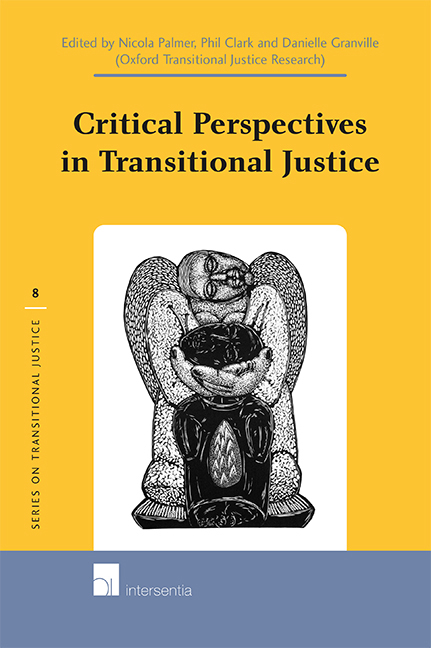Book contents
- Frontmatter
- Note
- Acknowledgements
- Contents
- Abbreviations
- Introduction
- Section 1 Critiquing Core Concepts in Transitional Justice
- Section 2 Accountability, Human Rights and the Rule of Law
- Section 3 Locality and Legitimacy
- Section 4 Memory, Ritual and Apology
- Section 5 Transitional Justice After Transition
- Contributors’ Biographies
- Series on Transitional Justice
21 - The End of Impunity? ‘Late Justice’ and Post-Transitional Prosecutions in Latin America
Published online by Cambridge University Press: 22 December 2020
- Frontmatter
- Note
- Acknowledgements
- Contents
- Abbreviations
- Introduction
- Section 1 Critiquing Core Concepts in Transitional Justice
- Section 2 Accountability, Human Rights and the Rule of Law
- Section 3 Locality and Legitimacy
- Section 4 Memory, Ritual and Apology
- Section 5 Transitional Justice After Transition
- Contributors’ Biographies
- Series on Transitional Justice
Summary
TRANSITIONAL JUSTICE IN LATIN AMERICA
In Latin America, the recent revival of efforts to hold perpetrators of past human rights violations personally accountable has seen hundreds of former security agents brought before the courts. The region's ‘Dirty Wars’ of the 1970s and 1980s are finally being addressed by local courts after years of de facto or de jure impunity. We are seeing the emergence of ‘post-transitional justice’, understood here as challenges to or deepening of transition-era settlements around truth, justice and reconciliation. In Latin America, these challenges have taken the form of a renewed wave of activity and debate over such questions after a period of relative quiet. This is a remarkable development for a region long identified with transition formulae that explicitly conceded amnesty for past atrocities. Patterns within this revival nonetheless vary: Central America and Brazil have seen few advances in formal accountability, although the latter recently convened a long-overdue truth commission. Paraguay concluded its own long-awaited truth process in 2008, and like Peru – where former autocrat Alberto Fujimori was recently handed a 25-year sentence – has no formal amnesty law preventing domestic prosecutions. In the Southern Cone, a handful of Uruguayan high officials and two former presidents are already in prison, although a late 2009 referendum failed to reach the necessary majority to revoke a transition-era amnesty law and a 2011 Supreme Court decision threatened to foreclose casebringing by reasserting domestic statute of limitations applicability to human rights violations. Neighbouring Argentina overturned amnesty provisions altogether in 2003, reopening hundreds of suspended cases. Chile, whose official path has been more cautious, nonetheless has by far the highest single total of former agents serving confirmed prison sentences for past violations.
These developments are worthy of note both for the region and beyond. Latin America's ‘export model’ of transitional justice in the 1980s after all did much to install the notion that some combination of truth-telling and amnesty was the best, in fact perhaps the only, route map for moving on from periods of military dictatorship and political violence. At that time, the desire to secure incipient democratisation processes and shelter new institutions was more or less explicitly weighed against individual and collective accountability for past crimes. As Juan Méndez observes: ‘They told us the options were democracy or justice because we couldn't have both’.
- Type
- Chapter
- Information
- Critical Perspectives in Transitional Justice , pp. 399 - 424Publisher: IntersentiaPrint publication year: 2012
- 5
- Cited by



